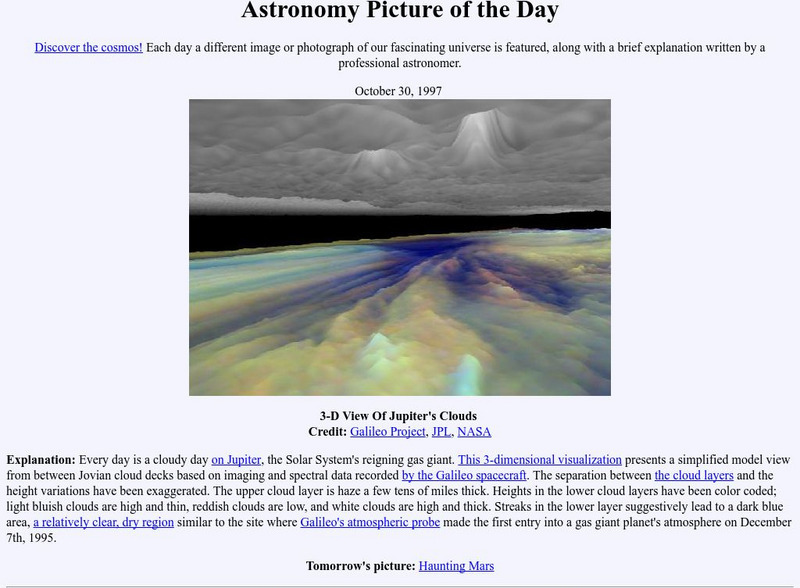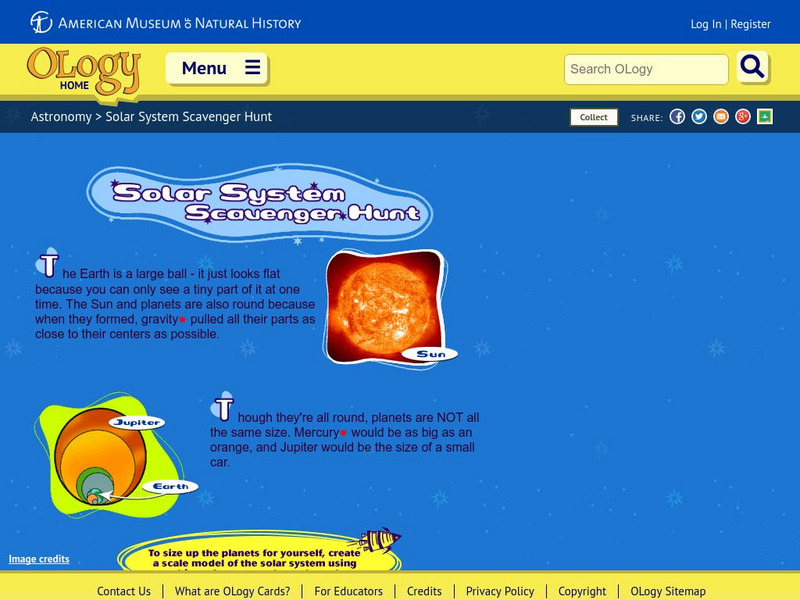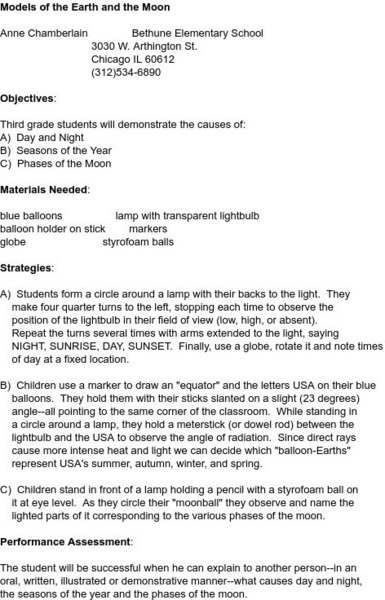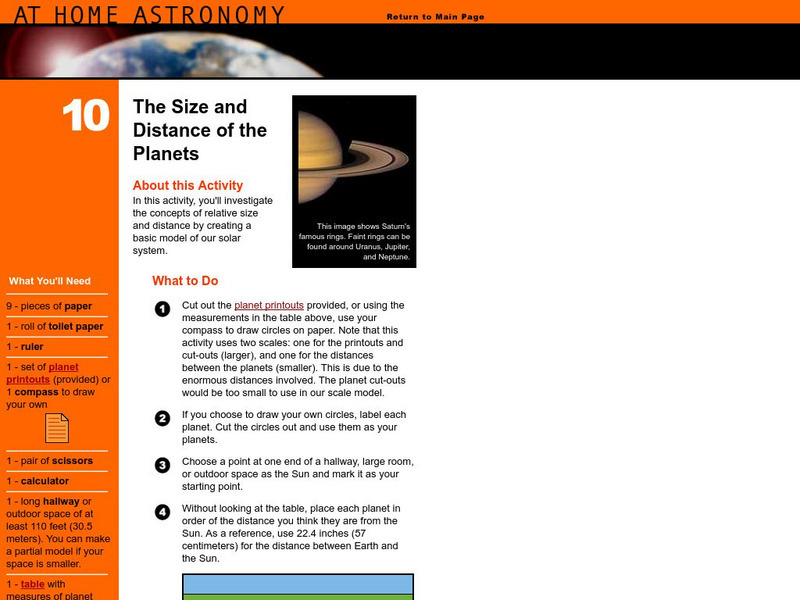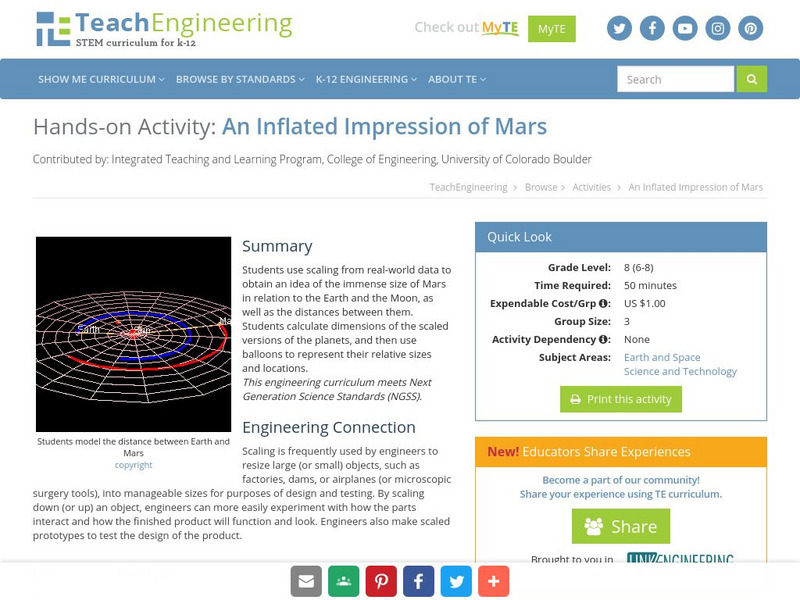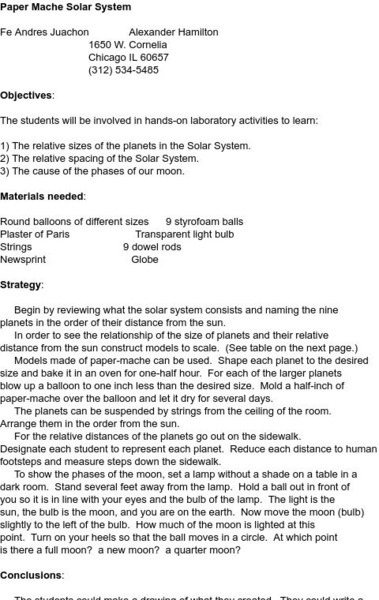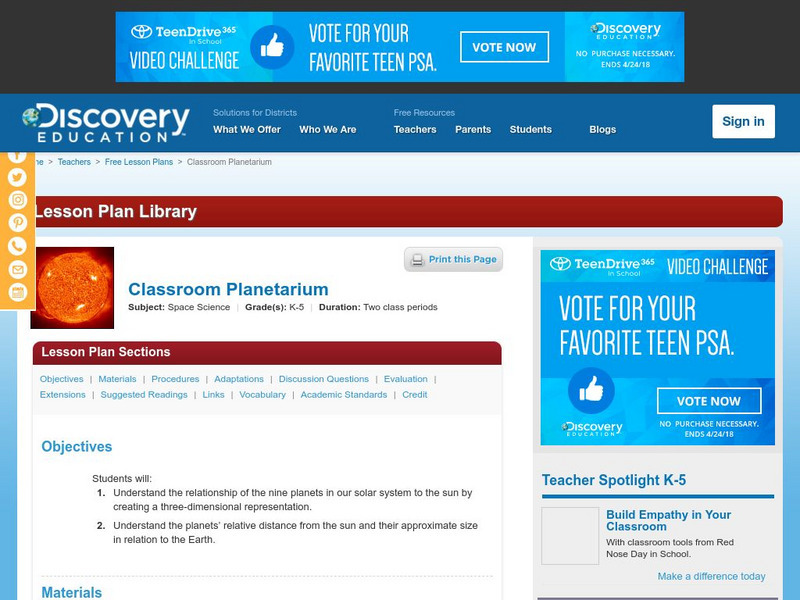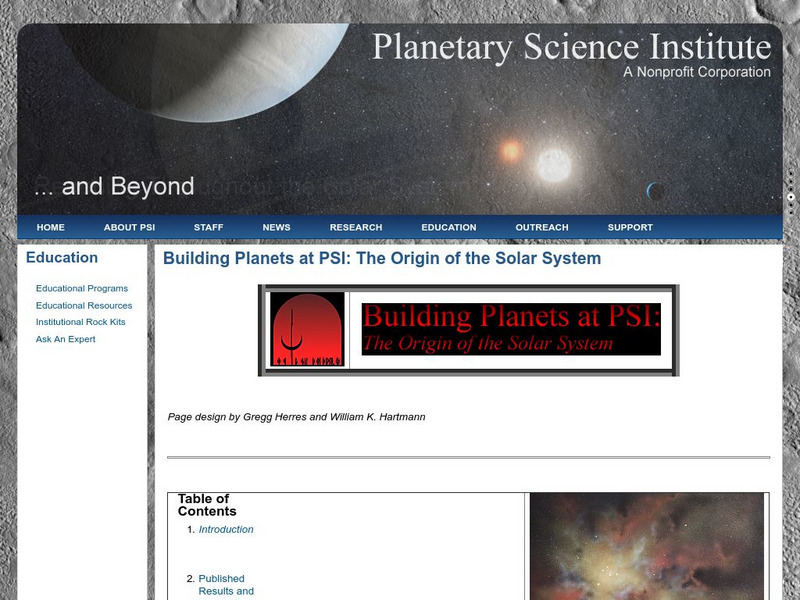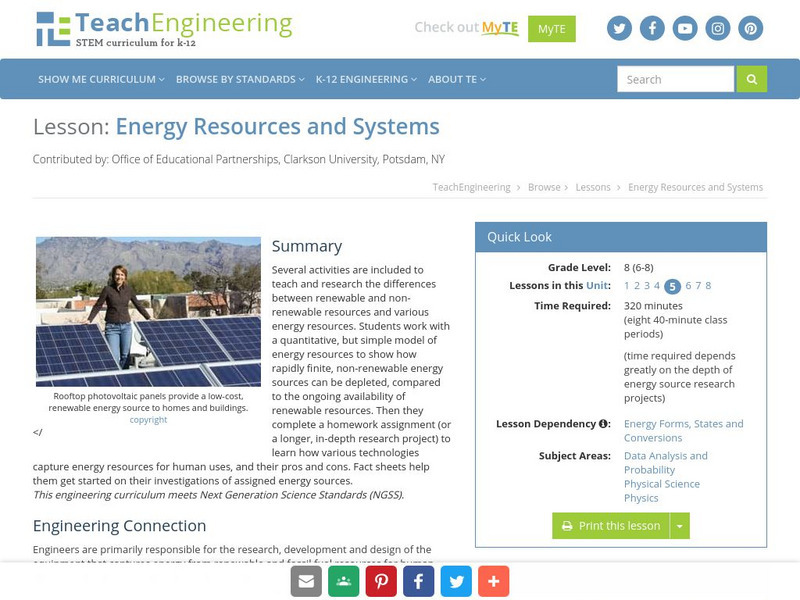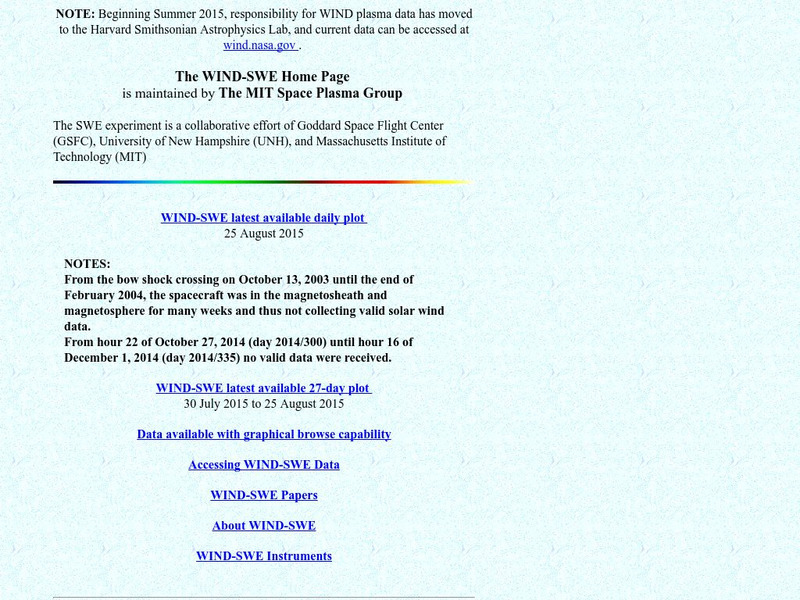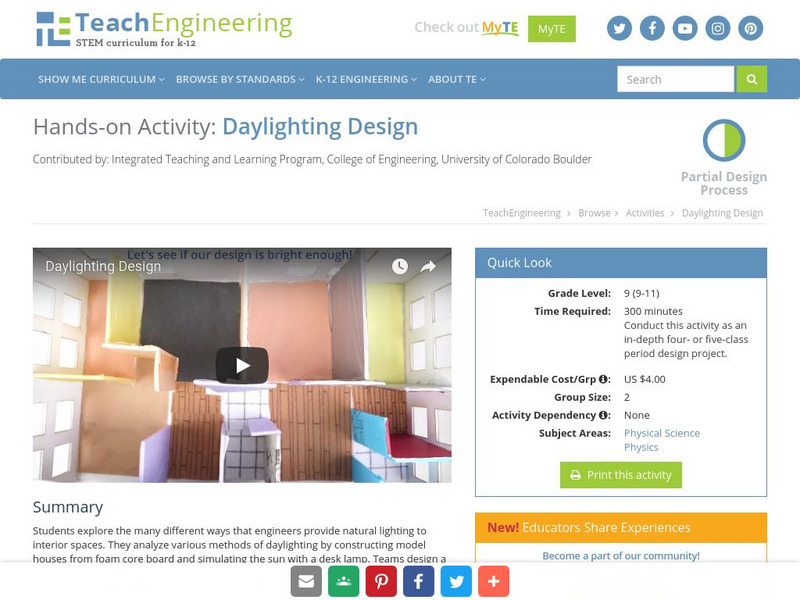Science Education Resource Center at Carleton College
Serc: Creating the Solar System
This two-part lesson plan begins with a lecture which describes the complex process of creation from molecular cloud to planetesimals to planets to organized solar system. The lecture is followed up with a draw/write activity in which...
NASA
Nasa: Astronomy Picture of the Day: Jupiter's Clouds 3 D
Every day is a cloudy day on Jupiter, the Solar System's reigning gas giant. This 3-dimensional visualization presents a simplified model view from between Jovian cloud decks based on imaging and spectral data recorded by the Galileo...
CK-12 Foundation
Ck 12: Earth Science: Revolutions of Earth
[Free Registration/Login may be required to access all resource tools.] How objects in the solar system orbit around each other.
CK-12 Foundation
Ck 12: Earth Science: Revolutions of Earth
[Free Registration/Login may be required to access all resource tools.] How objects in the solar system orbit around each other.
Science Struck
Science Struck: Simple Ideas for Your Kid's Solar System Project
Provides detailed instructions for how to help a student make a solar system model, and additional suggestions for making a constellation poster, making a model showing phases of the moon, and creating a solar system model to scale.
National Geographic
National Geographic: Planetary Size and Distance Comparison
Students review the sizes of planets and their order relative to the Sun. They then learn about astronomical uses and create a model of the solar system that reflects planetary distances. Includes handouts and worksheets as well as a...
American Museum of Natural History
American Museum of Natural History: O Logy: Stuff to Do: Scavenger Hunt
Illustrated instructions for creating a scale model of the solar system.
Science and Mathematics Initiative for Learning Enhancement (SMILE)
Smile: Models of the Earth and Moon
This lesson plan from the Illinois Institute of Technology demonstrates the causes of; day and night, seasons, and phases of the moon.With a few items, you help the elementary student discover why these phenomena occur.
Exploratorium
Exploratorium: A Guide to Astronomy Resources
A portal to resources on the sun, the Earth's neighboring planets, and the weather in space. Find out why Saturn is the "jewel of the Solar System" and explore what happens when Venus and Mercury make their rare transits across the sun.
University of Maryland
University of Maryland: The Astronomy Workshop
Find tools to calculate astronomical distances and sizes, to view various Solar System models, to compare gravity's affect on weight, and more. A good place to find interesting facts, simple animations, and astronomy links to physics and...
NASA
Nasa: Solar System Exploration
A website with various activities for different grade levels covering the subject of space exploration. Activities include building your own solar system, coloring pages, making models, and even a solar system cookbook.
University of California
Uc Berkeley: At Home Astronomy: The Size and Distance of Planets
In this activity, "You will investigate the concepts of relative size and distance by creating a basic model of our solar system." Planet printouts are provided and this site contains related links.
American Association of Physics Teachers
Com Padre Digital Library: Open Source Physics: Superior Ptolemaic Model
A simulation illustrating Ptolemy's geometrical system of explaining the varying speeds and directions of the planets, sun, and moon.
TeachEngineering
Teach Engineering: An Inflated Impression of Mars
The purpose of this activity is to use scaling in order to give students an idea of the size of Mars in relation to the Earth and the Moon as well as the distance between them. The students will have to calculate dimensions of the scaled...
Science Education Resource Center at Carleton College
Serc: Experimenting With Angular Diameter and Distance (Study of Outer Space)
In studying the solar system, students compare the relative sizes of the sun and the moon, and experiment with angular diameter, apparent diameter and distance.
Science and Mathematics Initiative for Learning Enhancement (SMILE)
Smile: Paper Mache Solar System
This site from the Illinois Institute of Technology provides a set of directions for the creation of a solar system model out of paper mache. Includes orbital distances and planet diameters for the nine planets. Great idea for a student...
The Wonder of Science
The Wonder of Science: Ms Ess1 1: Earth Sun Moon System
Develop and use a model of the earth-sun-moon system to describe the cyclic patterns of lunar phases, eclipses of the sun and moon, and seasons.
Idaho State University
Global Wind Systems [Pdf]
A great description of the global scale circulation and heat energy. Discusses a single-cell model, a three-cell model, jet streams and more.
Concord Consortium
The Concord Consortium: Molecular Workbench Zoom It
See examples of scales based on a range from ten to the twelfth meters to ten to the negative twelth meters. Examples range from parts of our solar system to the nucleus of an atom.
Discovery Education
Discovery Education: Classroom Planetarium
Create a classroom model of the solar system while teaching about relative size of all the planets, and each planet's distance from the sun.
Other
Planetary Science Institute: Building Planets at Psi
An article about the Planetary Science Institutes's advanced computer software, which it uses to model the way the solar system may have formed. Includes some insights into the results already obtained.
TeachEngineering
Teach Engineering: Energy Resources and Systems
Several activities are included to teach and research the differences between renewable and non-renewable resources and various energy resources. Students work with a quantitative, but simple model of energy resources to show how rapidly...
Massachusetts Institute of Technology
Mit: The Wind Swe Home Page
This is a technical site from MIT. It provides data and information from satellites which observe solar winds. Provide 3-D models of the heliosphere and uptodate plots of solar wind data.
TeachEngineering
Teach Engineering: Daylighting Design
Students explore the many different ways that engineers provide natural lighting to interior spaces. They analyze various methods of daylighting by constructing model houses from foam core board and simulating the sun with a desk lamp....

